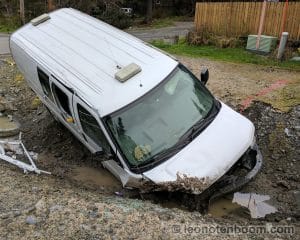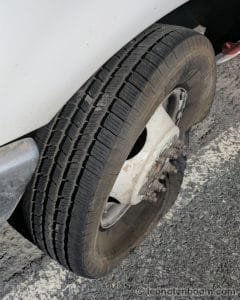All in all it was a pleasant way to do nothing.
I was sitting on a guardrail along the Seward highway a couple of miles outside of Girdwood, Alaska. The sun was out and felt warm on my face, the view was amazing, and I found myself taking a few moments just to let it all soak in. The only real downside was roar of the traffic flying by a few feet in front of me, and the fact that many of them weren’t really slowing down to avoid the U-Haul truck with a flat tire on the narrow shoulder.
The U-Haul that I was baby-sitting.
For me the day had also started out as eventfully.
As a ham radio operator I often volunteer my time to support charity events like bike rides. This was my first trip to Alaska to do radio support for the Bike MS ride that’s been held each of the last few years. My job as “SAG 1” (Supplies And Gear, #1) was to drive the 110 mile course, repeatedly, watching for cyclists in need of assistance, keeping and eye out for overall safety, and perform whatever other tasks might be assigned, all while radioing back status information and receiving instructions as needed from the ride coordinator.
Before the ride even started I was pulled aside by the ride director and asked to head out to what was apparently a car in a ditch by which the riders would soon be traveling. “You won’t miss it,” I was told.

Indeed. A van had someone managed to wedge itself into a deep ditch along the side of the road, and in the process had sent up a shower of rocks and debris over the path the cyclists would travel. My job was simple: sweep like hell to clear the path of debris before the riders got there.
While I did so the van’s apparent owner attempted to pull it out himself using a small flatbed truck, a single tow strap, and what I referred to as the “running start” method of towing. Needless to say that didn’t work. The van was still in the ditch when the race ended later in the day.
But the bike path remained clean.
Early weather did not cooperate, and the ride started off cold and wet. One of the first riders I helped (at a mandatory shuttle run for one specific narrow-shouldered section of the course) was soaked and pleaded with me to turn up the heat in my rented SUV. As the day wore on the weather slowly improved from cold and wet to cold and windy, with sun breaks. While tired, everyone’s attitude seemed to improve as things got drier.
The ride itself went very well. I probably drove upwards of 300 miles or more, back and forth between various rest stops, and managed to help a few riders along the way, in addition to those early morning mandatory shuttle runs.
The end of the day turned interesting once again.
As I was hanging out at one of the rest stops I noted the driver of the U-Haul truck used to ferry supplies around the course talking to the ride director, and then seemingly drive the truck around in a couple of circles. I didn’t really think too much of it, particularly after the truck drove off to the next rest stop a little while later.

Fast forward perhaps a hour, and while I was idling at the next rest stop myself I heard the call: the rental had a flat and was on the very narrow shoulder of the highway some miles ahead. Apparently the right front brake had been failing, finally seized, and the resulting overheating caused the tired to suddenly fail. Fortunately the driver was able to pull over, but as I mentioned, along a stretch of the highway with very narrow shoulders.
That’s how I came to find myself sitting behind the truck with a caution flag in one hand, my radio in another, enjoying the view, the warmth of the sun, and the ambiance of high-speed traffic a few feet in front of me, while the appropriate calls were made to get things fixed.
“Radio support” is often just that – running around and radioing information around. That, by itself makes for a much safer ride and a more enjoyable ride for all. But the reality — especially for the radio operators such as myself who are mobile and on the course — is that we’re often first on scene, or most available to perform a variety of tasks.
It’s at these times flexibility becomes our most important tool.
At the end of the day the ride was a success. All riders safe and accounted for (we’re not sure, but it’s possible that not one bandage was even used). The only “casualties” were vehicular inconveniences.

Well done, sir.
Perfect summary sir. Glad you were there.